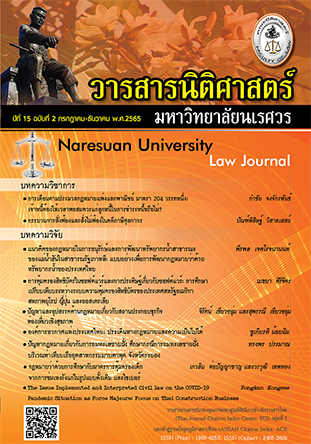The Process of Prosecuting and not Prosecuting in Customs Cases
Main Article Content
Abstract
This article analyzes the process of waiving prosecutions and settling cases in customs cases under the Thai Customs Act B.E.2560 (2017). Section 252 of the Act provides that the accused may be guilty of certain offenses irrespective of a willful intention to commit such offense which in accordance with the principle of mala in se and mala prohibita as well as legal principles of the Thai Penal Code and Thailand Criminal Procedure Code (TCPC) applied in criminal investigations. Prosecution for customs offenses under the Act differs from prosecutions under other laws. The Director-General may decide to prosecute a person for violating the Act by filing a criminal proceeding with the court. However, Section 256 of the Act empowers the Director-General to waive prosecution. Additionally, Section 257 empowers the Case Settlement Committee to settle cases involving certain violations. In both situations, the case shall be deemed terminated under the provisions of the Criminal Procedure Code. The result is that in some special cases that investigation have been completed, but the special case investigation officer and the public prosecutor had different opinions about the case due to using different principles for consideration. This problem may be resolved by giving the relevant customs agencies the power to prosecute cases themselves, or by establishing a central agency or moderating committee to investigate and screen such cases in order to avoid harming the public interest and to achieving fairness and clear balance of power.
Article Details
References
Chaikaseam Nitisiri. Criminal Procedure Code, Part 2 Investigation. 2nd ed. Bangkok: Institute of Legal Education of the Thai Bar, 2009. [in Thai]
Chalita Vilastrat. “Authority to File Criminal Cases of Customs Officers.” Master’s thesis, Master of Laws, Dhurakij Pundit University, 2009. [in Thai]
Isranews Press Office. “8 Years NACC. Lawsuit 69 Cases.” Accessed March 15, 2022. https://www.isranews.org/article/isranews-scoop/93413-isranewws-586.html. [in Thai]
Manote Rodsom. Knowledge of Customs Laws and Laws on Customs Tariffs. 6th ed. N.p.: N.p., 2018. [in Thai]
Nattawat Suttiyotin. Unit 2 Criminal Liability Theory. Nonthaburi: Sukhothai Thammathirat Open University, n.d. [in Thai]
Nitthanart Khongnual. “The inspection on the independence of Public Prosecutors under the Constitution of the Kingdom of Thailand B.E.2550 (2007).” Master’s thesis, Master of Laws, Dhurakij Pundit University, 2012. [in Thai]
Office of the Council of State. “Criminal Classification.” Accessed November 6, 2020. In Deepblue. www.krisdika.go.th>data>article77>filenew.pdf. [in Thai]
Pornthip L. Veeraphak. “Opinion against the Prosecutor’s Non-Prosecution Order in Special Cases According to the Special Investigation Act, B.E. 2004, Controversial Group, Department of Special Investigation, 2014.” Accessed November 9, 2020. www.dsi.go.th/files/201408131649573-ptum2.pdf. [in Thai]
Saweang Boonchalermwipas. Criminal Law. 5th ed. Bangkok: Winyuchon, 2008. [in Thai]
Sira Boonpinon. “Attorny of Discretion Control in Japan.” Sukhothai Thammathirat Law Journal 10, no. 1(1998): 93-101. [in Thai]
Songkhla Provincial Fisheries Office. “Customs Offenses and Penalties.” Accessed June 18, 2020. http://www.4.fisheries.go.th/file_document/20170129153304-_file.pdf. [in Thai]


